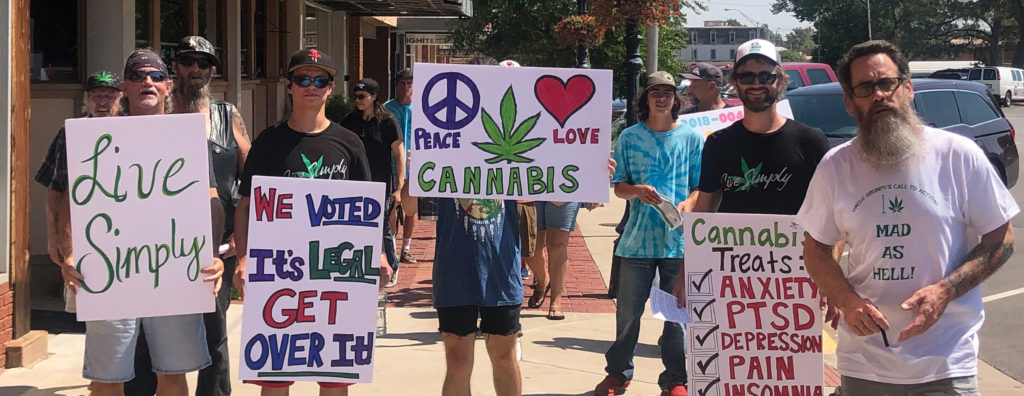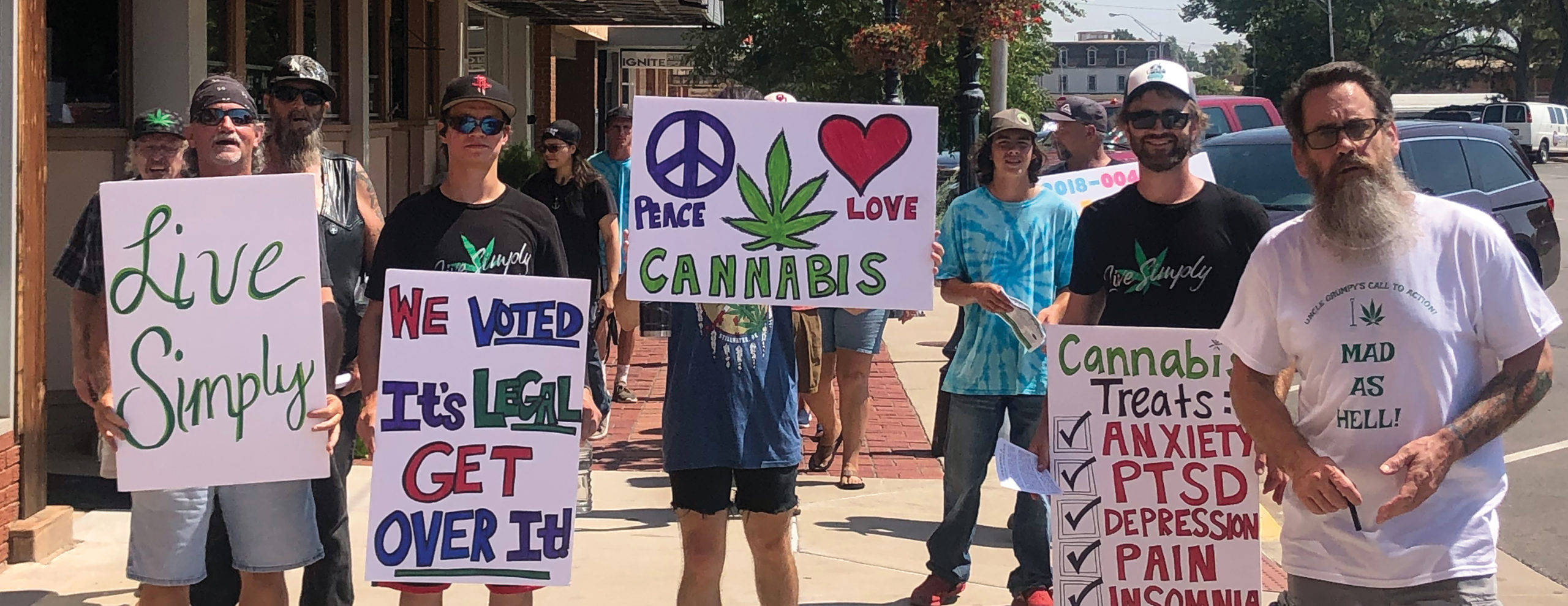by Sean Doherty, Student Reporter

In 1936 a propaganda film called “Reefer Madness” opened in theaters across America.
Among the “dangers” posed to America’s youth by the drug were: manslaughter, suicide and attempted rape.
Today, “Reefer Madness” is a term used by medical marijuana activists to describe dated information about the dangers—and possible benefits—of cannabis.
Eighty–three-year-old Jewel Ledo just started using Medical marijuana to control benign essential tremors. But Ledo didn’t always see cannabis as a medicine.
“I worked in the police department for 12 years,” Ledo said, “We were so against smoking marijuana when I worked there, and anyone picked up with a roach, smoking a cigarette got thrown in the tank.”
In June 2018, Oklahoma legalized medicinal cannabis with the signing of State Question 788. Now more than 83,000 Oklahoma residents carry a medical marijuana card, according to the Marijuana Policy Project. Licensed Oklahomans and caregivers can now possess up to three ounces of cannabis on their person and eight ounces at their residence, one ounce of concentrates, 72 ounces of edibles, six mature plants and six seedlings.
State Question 788 also decriminalized the use of cannabis in Oklahoma. The penalty for possessing up to 1.5 ounces of marijuana is now a maximum of a $400 misdemeanor fine, given the person can state a medical condition. However, non-violent felons convicted in the past two years or violent felons convicted in the past five do not qualify for a card, nor do individuals currently incarcerated.
Now, patients can cultivate their own medical marijuana, but most look to licensed dispensaries which aren’t hard to find. These dispensaries buy from licensed growers and processors in Oklahoma, and it is not uncommon to see two or more in relative proximity to each other, but always 1,000 feet from a school. Already, chains of dispensaries stretch across the state, but not without pushback.
On Aug. 20, 2018, the Alva City Council passed an ordinance to regulate the then recently legal medical marijuana in town. Ordinance 2018-004 set up parameters on how the city of Alva would handle the use, growth and legal distribution in town.
The ordinance required medical marijuana dispensaries and related businesses to be 1,000 feet from parks, playgrounds, schools, libraries, museums, churches, day care centers, other medical marijuana establishments, and residential areas. It also required a $500 annual fee to grow marijuana for personal use.
These restrictions barred any dispensaries from opening in the city limits of Alva, and restricted licensed patients’ ability to medicate. Many in the community saw this as unacceptable.
On Aug. 20, 2019, a year after the original ordinance passed, the Alva City Council met again to listen to citizen’s concerns.
Among the citizens in the crowd was Michelle DuPree, who announced her intent to protest the ordinance. According to the Alva-Review Courier, Dupree said, “I myself am not a Medical marijuana licensed patient; however, that doesn’t prevent me from being an advocate, and I seek your acknowledgment in this matter,”
She continued, “This protest includes an ordinance that effectively prevents any medical marijuana establishment from opening within the city limits, particularly in light of the fact that one such establishment met all the requirements handed down from the OMMA [Oklahoma Medical Marijuana Authority], passed the fire marshal’s inspection and was not allowed to open.
“We count on you to do what is best for the citizens of this city without letting your personal beliefs and opinions impair fair judgment. Many of your constituents believe that you have failed on this issue. I know that people have approached you spitting venom and making demands, and we are not that people. We are choosing to gather together and exercise our right to peacefully protest in the hopes that you will understand how these ordinances are affecting patients in Alva who have decided to medicate not with pharmaceuticals but with medical marijuana.”
Dupree then continued to read a written statement by her mother-in-law Cindy DuPree.
“I support everything Michelle said, and I will be protesting with her and many others. I didn’t always support marijuana as a medicine. I was taught my whole life that marijuana was a bad addictive drug. I had to change my views because of my own medical issues. I have scoliosis, chronic back pain, three slipped discs in my back, fibromyalgia, arthritis, headaches attacks and anxiety. I also have Huntington’s disease, which is a terminal brain disease with no cure and only one medication that is horribly expensive and has very bad side effects.
“I had to change a lifetime of bias against marijuana, and cannabis has helped me so much. I now can stand for longer than 10 or 15 minutes without crying. My anxiety attacks are at a minimum.
My fibromyalgia is manageable, and it helps with the muscle pain from Huntington’s. The only problem I have with using medical marijuana as my medicine, I can’t get medical marijuana here in Alva.

I can’t drive long distances, which is why I am protesting Alva’s medical marijuana ordinances, and I hope you understand why we need to fix this.”
Licensed dispensary owner Shane Corbitt waited until the end of the discussion to speak. According to the Courier, Corbitt said, “I’m the owner of Joint Pains LLC. I don’t have a lot to say to you folks other than thank you for letting us join. These folks in here make me do what I do.”
As promised, on Sept. 4, 2019, more than 50 people gathered on Alva’s square to protest ordinance 2018-004. Supporters handed out fliers, told their stories and walked around the local businesses with homemade signs.
Citizen lobbyist Chris Moe, who helped the Duprees organize the rally, said he went from 9,000 prescribed pharmaceutical drugs a year to 2,000 by switching to medical marijuana.
Shane Dupree, husband to Michelle Dupree and son to Cindy Dupree, said he saw immediate results after getting his card five months ago.
Dupree smokes the cannabis plant to ease his depression, anxiety and to ease his rheumatoid arthritis.
Before medical cannabis, Shane Dupree’s rheumatoid arthritis wore on him until the 36-year old’s joints look typical of a 60-year-old man. The pain affected him so much his wife Michele had to help him dress and even get to the bathroom.
Real-life demonstrations can really make impressions too. Amy Brown, a protester who uses medical marijuana to control her seizures, collapsed on the lawn. By the time paramedics arrived, she had received her medicinal cannabis and was fine. Moe said protesting is only the first step.
He outlined a plan to bus people from Alva to dispensaries in nearby Cherokee and Waynoka and encouraged people to come back with receipts to show Alva’s business owners the amount of money spent out of their town.
He also threatened legal action if the ordinance was not dealt with swiftly.
In fact it had already been threatened. According to the Review-Courier, Mayor Kelly Parker, City Attorney Rick Cunningham and members of city council received letters from John Hickey of Hall Estill Law Firm, stating the ordinance was illegal and the firm planned to sue the city if the ordinance was not repealed.
The letter stated the ordinance violated the law by requiring medical marijuana businesses to obtain permits from the city; imposing a fee upon Medical marijuana businesses; imposing zoning restrictions prohibiting the location of medical marijuana businesses within 1,000 feet from schools, parks, residences and other locations; imposing restrictions regarding days and hours of operation; and requiring certain fencing and security requirements.
A day after the protest, the Alva City Council’s Ordinance Review Committee called an emergency meeting.
The committee recommended that the 1,000-foot distance requirement from library or museum, a public playground, a child care center, a place of worship or religious assembly, a public park, pool or recreation facility; a juvenile or adult halfway house, correctional facility or substance abuse rehabilitation or treatment center; and another medical marijuana or retail marijuana establishment be lowered to 300 feet. The restriction from a private or public preschool, elementary, secondary, vocational or trade school, college or university is still 1000 feet.
They also recommended the distance requirement by removed entirely from residential areas, granted the business is still in a commercially zoned area. The committee also recommended eliminating the $500 fee to grow marijuana for private use.
At the Sept. 16 meeting, the Alva City Council unanimously voted to accept the recommendations of the Ordinance Review Committee without any discussion.
“It’s a huge win,” Corbitt said, “for not only me as a businessman, but for these people right here. They’re customers, they’re patients, they’re advocates. I did not do this alone.”
Ledo, who spoke at both the August and September meetings, said she was proud of the city council. “It may not help me a lot, but it helps other people so I approve of that.”
A week later, the tall grass covering the “Now Open!” sign in front of Joint Pains LLC. is mowed and cars sit parked in front of the green concrete barriers. Corbitt is optimistic about the future.
“We’re gonna grow,” Corbitt said, “We’re gonna grow big time.”

